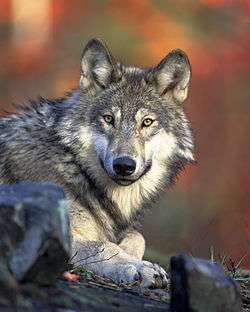Definify.com
Webster 1913 Edition
Wolf
Wolf
,Webster 1828 Edition
Wolf
WOLF
,Definition 2026
Wolf
Wolf
English
Proper noun
Wolf
- The constellation Lupus.
See also
Etymology 2
From Middle English and German short forms of given names containing the Germanic element "wolf".
Proper noun
Wolf
- A surname.
German
Etymology
From Middle High German wolf, from Old High German wolf, from Proto-Germanic *wulfaz, from Proto-Indo-European *wĺ̥kʷos. Compare Dutch and English wolf, Danish ulv, Gothic 𐍅𐌿𐌻𐍆𐍃 (wulfs).
Pronunciation
- IPA(key): /vɔlf/
Noun
Wolf m (genitive Wolfs or Wolfes, plural Wölfe, feminine Wölfin)
- wolf
- (astronomy) the constellation Lupus
- shredder, mincer
- skin abrasion (acquired on long hikes or marches, through the friction of one's clothes)
Declension
Derived terms
|
|
Proper noun
Wolf
- A male given name, short form of Germanic compound names beginning with the element Wolf-, particularly Wolfgang.
- A surname derived from the given name, or as a nickname from the animal. Variant: Wolff.
wolf
wolf
English

Noun
wolf (plural wolves)
- A large wild canid of certain subspecies of Canis lupus.
- A man who makes amorous advances on many women.
- (music) A wolf tone or wolf note; an unpleasant tone produced when a note matches the natural resonating frequency of the body of a musical instrument, the quality of which may be likened to the howl of a wolf.
- This cello has a terrible wolf on the D string around 'F'.
- One of the destructive, and usually hairy, larvae of several species of beetles and grain moths.
- the bee wolf
- (figuratively) Any very ravenous, rapacious, or destructive person or thing; especially, want; starvation.
- 1918, W. B. Maxwell, chapter 7, in The Mirror and the Lamp:
- “ […] Churchill, my dear fellow, we have such greedy sharks, and wolves in lamb's clothing. Oh, dear, there's so much to tell you, so many warnings to give you, but all that must be postponed for the moment.”
- They toiled hard to keep the wolf from the door.
-
- A white worm, or maggot, which infests granaries.
- (obsolete) An eating ulcer or sore. See lupus.
- (Can we date this quote?), Jeremy Taylor, (Please provide the title of the work):
- If God should send a cancer upon thy face, or a wolf into thy side.
-
- A willying machine.
- (Can we find and add a quotation of Knight to this entry?)
Hypernyms
- (large wild canid): Canis lupus, canid
Hyponyms
- (large wild canid): she-wolf
Coordinate terms
- (large wild canid): dingo, dog (members of Canis lupus not called wolf); coyote, jackal, fox (other canids)
Derived terms
|
Translations
|
|
Verb
wolf (third-person singular simple present wolfs, present participle wolfing, simple past and past participle wolfed)
- (transitive) To devour; to gobble; to eat (something) voraciously.
- 1987, James Ellroy, The Black Dahlia:
- After a wolfed burger dinner, I called the night number at Administrative Vice and inquired about known lesbian gathering places.
- 2013, Neil Martin, Collected Stories of the Sea:
- Vicars seated himself and began wolfing a sandwich.
-
Synonyms
Translations
|
Anagrams
Afrikaans
Etymology
From Dutch wolf, from Middle Dutch wolf, from Old Dutch *wulf, *wolf, from Proto-Germanic *wulfaz, from Proto-Indo-European *wĺ̥kʷos.
Noun
wolf (plural wolwe, diminutive wolfie)
Dutch
Pronunciation
- IPA(key): /ʋɔlf/
Etymology
From Middle Dutch wolf, from Old Dutch *wulf, *wolf, from Proto-Germanic *wulfaz, from Proto-Indo-European *wĺ̥kʷos. Cognate to English wolf and German Wolf.
Noun
wolf m (plural wolven, diminutive wolfje n, feminine wolvin)
Related terms
Middle English
Etymology
From Old English wulf, from Proto-Germanic *wulfaz, from Proto-Indo-European *wĺ̥kʷos.
Noun
wolf (plural wolves)
Descendants
- English: wolf
Middle High German
Etymology
From Old High German wolf, from Proto-Germanic *wulfaz, from Proto-Indo-European *wĺ̥kʷos.
Noun
wolf m
Descendants
- German: Wolf
West Frisian
Etymology
From Old Frisian wolf, from Proto-Germanic *wulfaz, from Proto-Indo-European *wĺ̥kʷos. Compare Dutch and English wolf, German Wolf, Danish ulv.
Noun
wolf c (plural wolven)